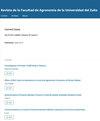草甘膦氧化胁迫下部分高级硬麦品系叶绿素含量和膜稳定性的体外抗旱性评价
IF 0.5
4区 农林科学
Q4 AGRONOMY
Revista De La Facultad De Agronomia De La Universidad Del Zulia
Pub Date : 2023-02-04
DOI:10.47280/revfacagron(luz).v40.n1.07
引用次数: 0
摘要
草甘膦引起的氧化应激是一种复杂的化学和生理现象,是活性氧(ROS)过量产生和积累的结果。本研究在阿尔及利亚国家农艺研究所(INRAA) Setif进行体外试验,通过评价叶绿素含量降解和细胞膜渗漏,筛选草甘膦除草剂诱导氧化应激下最敏感的硬粒小麦(Triticum durum L.)。基因型在几乎所有研究性状中都表现出显著差异。G5基因型的叶绿素损失率为26.42% ~ 48.75%,草甘膦敏感性指数在0.65 ~ 1.2之间,先进系G5对氧化胁迫的耐受性最强,叶绿素损失率最低,草甘膦敏感性指数最低。此外,先进生产线G4的漏液率最高(80.16%),而G6的漏液率最低(50.77%)。因此,先进系G5和G6最适合生长条件。本文章由计算机程序翻译,如有差异,请以英文原文为准。
Evaluation of chlorophyll content and membrane stability under oxidative stress induced
by glyphosate herbicide as indicators of drought tolerance in some advanced durum
wheat (Triticum durum L.) lines: in vitro study
Oxidative stress caused by glyphosate is a complex chemical and physiological phenomenon and develops as a result of overproduction and accumulation of reactive oxygen species (ROS). This study was carried out in vitro at the National Institute of Agronomic Research of Algeria (INRAA) Setif, to select the most susceptible durum wheat (Triticum durum L.) under oxidative stress induced by glyphosate herbicide by evaluating chlorophyll content degradation and cell membrane leakage. Genotypes showed significant variations in almost all the studied traits. The chlorophyll loss ratio ranged from 26.42 % for the genotype G5 to 48.75 % for the local variety Boutaleb, glyphosate sensitivity index values were found to be between 0.65-1.2, the advanced line G5 was found to be the most tolerant under oxidative stress with the lowest chlorophyll loss ratio and lowest Glyphosate sensitivity index. Furthermore, the advanced line G4 recorded the highest electrolyte leakage (80.16 %) while G6 showed the lowest estimate (50.77 %). Therefore, advanced lines G5 and G6 appear the most suitable for the growing conditions.
求助全文
通过发布文献求助,成功后即可免费获取论文全文。
去求助
来源期刊
CiteScore
0.50
自引率
0.00%
发文量
45
审稿时长
>12 weeks
期刊介绍:
La Revista de la Facultad de Agronomía de la Universidad del Zulia publica artículos científicos, notas técnicas, comunicaciones rápidas y artículos invitados originales e inéditos, es decir, que no hayan sido publicados ni enviados simultáneamente a otra revista para su publicación, de autores interesados en el campo agrícola vegetal y agrícola animal. De presentarse el caso que el autor o autores hubiesen enviado o publicado su manuscrito simultáneamente en otra revista, podrán ser sancionados con la no publicación en esta revista por tiempo indefinido.
Se admiten manuscritos escritos en idioma Español, Portugués o Inglés, con un resumen en Español o Portugués y otro en Inglés (Abstract).

 求助内容:
求助内容: 应助结果提醒方式:
应助结果提醒方式:


